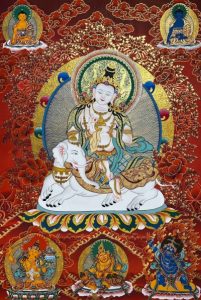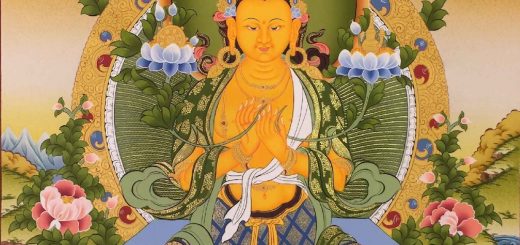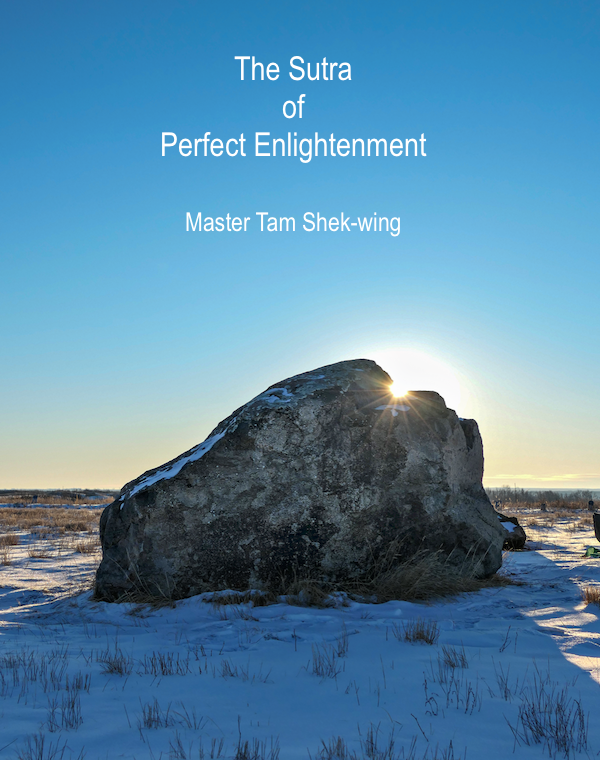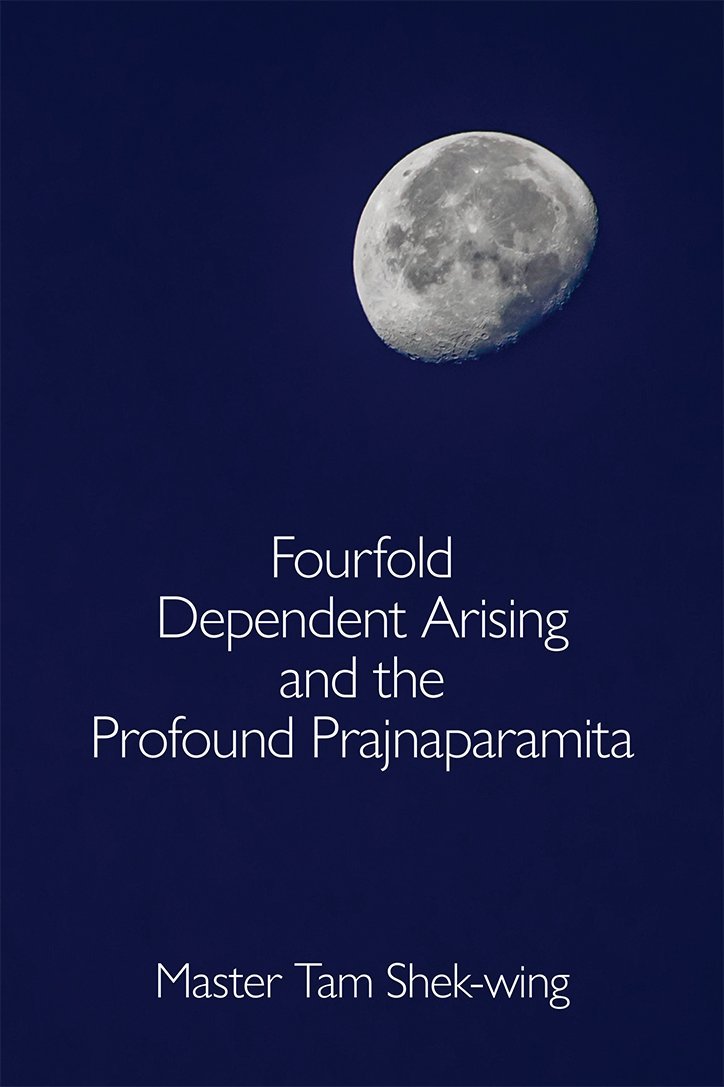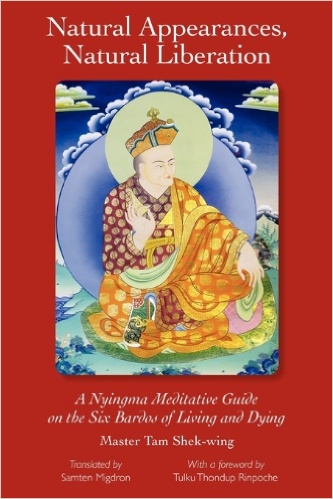Perfect Enlightenment 9: On the Samādhi of Illusion
Show scripture (Chinese). 爾時,世尊告普賢菩薩言:「善哉!善哉!善男子!汝等乃能為諸菩薩及末世眾生,修習菩薩如幻三昧,方便漸次,令諸眾生得離諸幻。汝今諦聽!當為汝說。」時,普賢菩薩奉教歡喜,及諸大眾默然而聽。 「善男子!一切眾生種種幻化,皆生如來圓覺妙心,猶如空花從空而有,幻花雖滅空性不壞;眾生幻心還依幻滅,諸幻盡滅覺心不動。依幻說覺亦名為幻,若說有覺猶未離幻,說無覺者亦復如是。是故,幻滅名為不動。善男子!一切菩薩及末世眾生,應當遠離一切幻化虛妄境界,由堅執持遠離心故,『心如幻』者亦復遠離,『遠離為幻』亦復遠離,『離遠離幻』亦復遠離,得無所離即除諸幻。譬如鑽火兩木相因,火出木盡灰飛煙滅;以幻修幻亦復如是,諸幻雖盡不入斷滅。善男子!知幻即離,不作方便;離幻即覺,亦無漸次。一切菩薩及末世眾生依此修行,如是乃能永離諸幻。」 Show scripture (English). Then the World Honoured One, speaking to Samantabhadra Bodhisattva said: “Excellent, excellent! Good son, you have well asked the Tathāgata on behalf of the bodhisattvas and the sentient beings of the degenerate age about the expedient stages of the practice of the bodhisattva’s illusion-like-samādhi. This practice enables all the sentient beings to gain freedom from illusion. Now listen well, and I shall explain it for you.” Samantabhadra received this teaching with great joy and reverence; all in the great assembly became silent and listened. “Good sons, all sentient beings’ various illusions are born from the perfectly enlightened marvelous mind of the Tathāgata, just like the sky-flowers come to exist from the sky. But even though the illusory flowers vanish, the nature of the sky is indestructible. The illusory mind of sentient beings also vanishes based on illusion, and while all illusions are utterly annihilated, the enlightened mind is unchanged. The use of illusion to speak of enlightenment is also called illusion. If you say there is enlightenment, you are not yet free from illusion. If you say there is no enlightenment, this is the same thing. Therefore, the cessation of illusion is called unchanging.” “Good sons, all bodhisattvas and sentient beings of the degenerate age should separate from all illusory and false realms. By firmly abiding in the liberated mind, one also becomes free from the “illusion-like mind,” one is also free from the “freedom as illusion,” and also free from “becoming free from the freedom from illusion.” Attaining what is beyond liberating, which is the removal of all illusion. It is like making a fire with two sticks. The fire blazes and the wood is consumed; the ashes fly away and the smoke vanishes. Using illusion to remedy illusion is exactly like this. Yet even though all illusions are extinguished, you do not enter into nihilism.” “Good sons, when you know illusion, you will immediately be free, without devising expedient means. Freedom from illusion is enlightenment, and there are no stages. All bodhisattvas and sentient beings of the degenerate age who practice like this will be permanently free from all illusion.” Buddha’s answer to Samantabhadra’s questions was in fact instructions to practicing the illusion-like samādhi. First, Buddha pointed out that all phenomena are illusory arising, arisen from “the perfectly enlightened marvelous mind of the Tathāgata.” While the arising themselves are illusive, “the perfectly enlightened marvelous mind” that gives rise to these phenomena is not. The “perfectly enlightened marvelous mind” is the marvelous mind that possesses the perfect enlightenment. Because it is beyond conceptuality, it is said to be marvelous. All illusions arise from this mind, and yet this mind that possesses the perfect enlightenment has never changed, it is only via dependent arising where all illusions are perceived. Being “immovable and spontaneous” is why this “perfectly enlightened marvelous mind” is labeled as “the perfectly enlightened marvelous mind of the Tathāgata.” More concretely, one can say that in the mind of every being, there exists dharmakaya or the Buddha-Within. This does not mean that in the mind of every being there exists already the wisdom of enlightenment, nor does it mean that dharmakaya has been revealed. All illusions are in truth… Show more. dependent arisings, with the perfectly enlightened marvelous mind as the cause (the causal ground). Ignorance as the dependent origination gives rise too all sorts of illusion. Arousing Faith in the Mahāyāna refers to this perfectly enlightened marvelous mind as the ocean, ignorance as the wind. When the wind blows, there are ocean waves, such waves are the various illusions. When the waves calm, the ocean remains. Similarly, when the illusions cease, the mind with the awareness remains. This is a very important point, the key to practicing the illusion-like samādhi, because it is the basis to Buddha’s answers to all subsequent bodhisattvas. Therefore, this is a practice of the illusive mind, not an annihilation of mind, for it is a liberation from illusion. When the mind is liberated from all illusions, the awareness arises. How does one become liberated from illusions, Buddha’s answer was straightforward, “[W]hen you know illusion, you will immediately be free.” Knowing that the object of mind is like the flowers in the sky, that they are all illusory, one becomes simultaneously free from them. This is akin to waking from a dream, one becomes free from it. This is the sudden realization. Buddha said, “[W]ithout devising expedient means, [f]reedom from illusion is enlightenment, and there are no stages.” This is analogous to “the fire blazes and the wood is consumed.” By “without devising expedient means,” it means that there is no need to establish special practices to remove the illusion, nor to establish practices to arouse the awareness. It is a practice without contrivance, that is, a practice with no pre-conceived notions, such as emptiness. Simply, it is not a practice to transcend illusion with an intention, nor is it a practice towards enlightenment with an intention. Because “when you know illusion, you will immediately be free,” and “freedom from illusion is enlightenment.” This instruction would give rise to Universal Vision Bodhisattva’s question later. Show scripture (Chinese). 爾時,世尊欲重宣此義而說偈言: 普賢汝當知, 一切諸眾生, Show scripture (English). Then the World Honoured One, wanting to restate the message, spoke a verse. He said: Samantabhadra, you should know The verse summarizes the secret meaning of the illusory practice. 1. From beginningless time, the “illusory ignorance” is established by the perfectly enlightened mind of Tathāgata. Therefore, within the consciousness realm, all illusion-like phenomena can be said to be arisings of dharmakaya. 2. The illusion-like consciousness realm abides in dharmakaya to manifest itself. It can be said to be with appearance abiding in the vast expanse (here, by analogy, dharmakaya is like the vast expanse). One can arrive at the certainty that “Though the sky-flowers vanish / The sky has never changed.” Here we can use the analogy of twilight with the sky (vast expanse) as the background. When the twilight dissipates, the sky remains, as per the verse, “In the cessation of illusion, enlightenment remains perfectly complete.” 3. It is not because of an expedient means to cause the enlightenment to arise. To speak of “primordial awareness” is an expedient saying – when one surpasses the illusions, the primordial awareness is naturally perfect and complete. Therefore, one cannot say there are stages of cultivating the awareness. People who reject the idea of primordial awareness most likely do not pay attention to this message in this section of the scripture. It clearly says, “If you are enlightened, then there are no stages of practice / Nor is there such a thing as expedient means.” The whole fuss on the wording of “primordial awareness” is entirely uncalled for. Click here for what has been posted so far in the series.Chinese:
English:
Commentary:
 What is this perfectly enlightened marvelous mind of the Tathāgata? The “Tathāgata” here refers to the primordial buddha nature in all sentient beings, in other words, dharmakaya primordially exists in the mind of all beings. The Huayan tradition calls this primordial mind as “immovable and spontaneous.” The essence of dharmakaya (buddha nature) is unchanging but possesses the capacity for dependent arising. The Nyingma tradition calls it the Buddha-Within, for its wisdom realm is firmly abiding, unchanging, uncontaminated, and yet it has the capacity to give rise to consciousness realms. These consciousness realms stem from the wisdom realm, they arise naturally and spontaneously. The sayings of the two schools, Huayan and Nyingma, are in essence the same, it is just that the Huayan tradition does not emphasize that dharmakaya as buddha’s wisdom realm of inner self-realization.
What is this perfectly enlightened marvelous mind of the Tathāgata? The “Tathāgata” here refers to the primordial buddha nature in all sentient beings, in other words, dharmakaya primordially exists in the mind of all beings. The Huayan tradition calls this primordial mind as “immovable and spontaneous.” The essence of dharmakaya (buddha nature) is unchanging but possesses the capacity for dependent arising. The Nyingma tradition calls it the Buddha-Within, for its wisdom realm is firmly abiding, unchanging, uncontaminated, and yet it has the capacity to give rise to consciousness realms. These consciousness realms stem from the wisdom realm, they arise naturally and spontaneously. The sayings of the two schools, Huayan and Nyingma, are in essence the same, it is just that the Huayan tradition does not emphasize that dharmakaya as buddha’s wisdom realm of inner self-realization.Chinese:
無始幻無明, 皆從諸如來,
圓覺心建立。 猶如虛空花,
依空而有相, 空花若復滅,
虛空本不動。 幻從諸覺生,
幻滅覺圓滿, 覺心不動故。
若彼諸菩薩, 及末世眾生,
常應遠離幻, 諸幻悉皆離。
如木中生火, 木盡火還滅,
覺則無漸次, 方便亦如是。English:
The beginningless illusory ignorance
Of all sentient beings
Is all created from
The perfectly enlightened mind of all the Tathāgatas.
It is just like the sky-flowers
Which have their appearance in relation to the sky;
Though the sky-flowers vanish
The sky has never changed.
Illusion is born from enlightenment;
In the cessation of illusion, enlightenment remains perfectly complete.
This is because the enlightened mind is changeless.
If these bodhisattvas
And sentient beings of the degenerate age
Always appropriately separate from illusion,
They will completely free themselves from it.
Like the flame that springs from wood:
The wood is consumed and the flame again disappears.
If you are enlightened, then there are no stages of practice
Nor is there such a thing as expedient means.Commentary:
